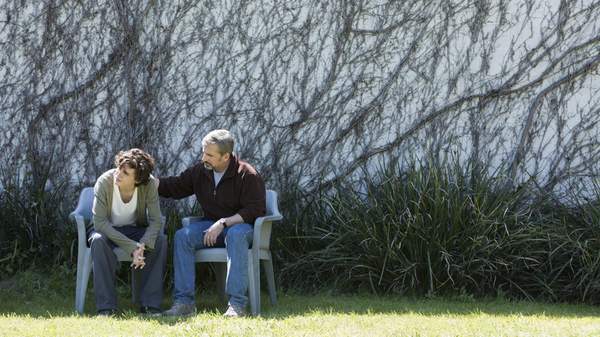Overview
It has been a busy two years for Timothée Chalamet, aka the internet's current boyfriend. Not too long ago, he was best known for a bit part in Interstellar, and now he's one of cinema's biggest talents. Chalamet swooned over first love in the gorgeous Call Me By Your Name, and was nominated for an Oscar for his impeccable performance. He played one of the titular character's first loves in Lady Bird, a film that nabbed Oscar nominations for almost everyone else involved. In his latest movie, Beautiful Boy, he's grappling with addiction — and he'll likely receive plenty of awards love again. This true life drama stands out from Chalamet's recent hits, however, and not in a positive way. His work is exceptional once more, inhabiting rather than performing his troubled character, but the film doesn't do its star justice.
Or, to be more accurate, it doesn't do its stars justice. Beautiful Boy is a father-and-son drama as much as it is a deep dive into the trauma wrought by drugs, with Steve Carell as journalist David Sheff and Chalamet as his bright, thoughtful, college-bound son Nic. David can only watch on as Nic escalates from casual marijuana use to an insatiable crystal meth habit, and the respective tolls of bearing witness to, and spiralling through, the depths of addiction are written across Carell and Chalamet's faces. Each actor plays their character like a man possessed, one by trying to understand what drove his boy down this path, the other by an urge that he can't and won't stop indulging. Or perhaps it's that they both seem like they're haunted — by dreams, wants, needs and choices, and by a life that's not what either originally planned.
Based on separate memoirs by the actual David and Nic, Beautiful Boy's details are familiar. Viewers first meet David when he's asking an expert exactly what all of these illicit substances are doing to Nic, before the movie jumps back to show the progression to that point and beyond. The Sheff household is happy, with David remarried to painter Karen (Maura Tierney), and Nic getting along with both his stepmother and much-younger half-siblings. But then, suddenly nothing is happy. All that's changed is Nic, and his newfound penchant for getting high rather than burying his head in a book. Soon he's withdrawn and sullen, out late and disappearing for periods of time, and hiding his soulful gaze further and further behind his dark, wavy locks.
Every moment that Chalamet and Carell are on screen, either individually or together, it's easy to believe the Sheffs' plight. Beautiful Boy can't answer why Nic dissolves into his addiction, other than the fact he enjoys taking drugs. It can't explain why this thoroughly middle-class family is put through such an ordeal, other than the fact that the unexpected happens. With images that feel both dreamy and gritty simultaneously, what it can do instead is depict the torturous aftermath. The results are authentic and heartfelt, thanks to the film's basis in reality, its brilliant leads, and the stellar support offered by Tierney and Amy Ryan (as David's first wife and Nic's mother). And yet, while the actors make the most intimate, internalised and difficult of emotions ring true, conveying the pain and suffering that clearly changed the Sheffs' lives, the movie itself couldn't be more heavy-handed.
Even if it actually happened, having one character read "I just love drugs" in another's diary, or words to that effect, isn't the most subtle of moves. The same applies to Beautiful Boy's use of Nirvana, Neil Young, John Lennon and more on its soundtrack — songs which may stem from the Sheff's real-life music choices, yet are always deployed to obvious effect. While nuance wasn't in director Felix Van Groeningen's wheelhouse when he helmed the heartstring-tugging Broken Circle Breakdown in 2012, he's made a much less effective melodrama this time around. Beautiful Boy is still a moving, affecting picture — with its two main stars putting in some of their best work, how could it not be? — but it never trusts that viewers will respond accordingly. Chalamet and Carell show the audience what the Sheffs went through, however the film itself doesn't just want to tell their story. Rather, it wants to scream it, and to push every sentimental, blunt and cliched button.
